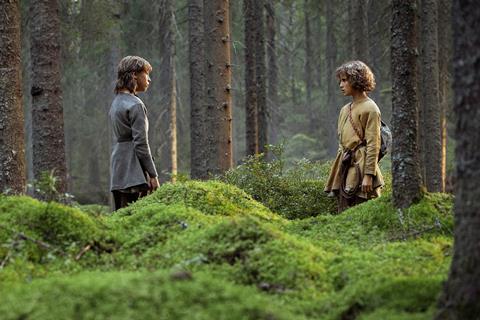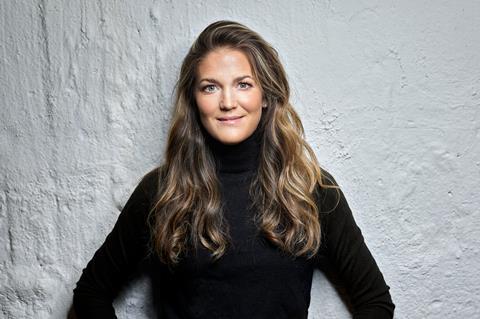As Nordic platform Viaplay expands into North America and the UK, EVP and chief content officer Filippa Wallestam talks to Screen about the plan to go richer and deeper on both local and English-language content.

Like many other international streamers, Viaplay found it was time in 2022 to slightly reframe its activities. “It’s fair to say we had a phase of expanding in a lot of new markets. And now we are in a phase of going deeper into those markets we’re already in,” says Viaplay Group EVP and chief content officer Filippa Wallestam.
The company started 2023 with some previously planned expansions. Its UK service launched in late 2022, the US followed in February 2023 and Canada launched its SVoD offering on March 7. Germany, Austria and Switzerland were on the dock for 2023 but are currently on hold.
Viaplay — headquartered in Sweden — was launched in 2007 as Viasat On Demand, later part of the Nordic Entertainment Group (Nent), now rebranded as Viaplay Group. The platform has more than 7.3 million subscribers across the Nordics, Baltics, Poland, the Netherlands and the UK, with a target to reach 12 million by the end of 2025.

The next phase will be working in more strategic ways in its existing markets rather than adding a string of others, says Wallestam. “In Poland and the Netherlands, we’ve actually gone a lot bigger [in terms of subscriber numbers] than our original projections. So how do we now cater for this bigger audience that we have? Can we get more content for these audiences?
“That’s why we are adding local teams [in Warsaw and Amsterdam] on the ground to these markets that have become very big,” she continues. “It’s not just the Nordics with some add-ons. It’s now a truly international company.”
Wallestam says Viaplay has been well-placed to navigate the upheaval of the last few years. “It’s a very dynamic marketplace [that’s] always changing, both for the good and the bad. What changes we’ve seen in the streaming market over the past few years were mostly what we were expecting,” she says of global trends. “Two years ago, the most-asked questions I got were, ‘How can you defend yourself in the Nordics against the global streamers?’ and, ‘How are you going to continue to do deals to get Hollywood content?’
“Our answer is the same as it was then — if you look at us in the Nordics, there is no-one like us. We have three main legs — our portfolio of sports rights, our strong, acquired content from Hollywood and all the local shows we produce. Nobody else is producing as much content as we do in the Nordics. Our position is unique.”
The studio deals — with varying territories for each — include with Sony, MGM, NBCUniversal and Paramount.
Wallestam is not naïve to the challenges of a highly competitive marketplace. “Our shows need to stand out more than they needed to three years ago because the market is a lot more robust. This requires more of our marketing teams.”
After a few years of international operations, the mix of content is now spread more evenly between popular returning shows and new offerings. “I think 2023 is going to be our strongest year ever,” says Wallestam. “We are planning to premiere 130 shows, of all genres — that includes our local non-scripted shows as well as dramas and documentaries. That range is the really cool part — we have some extremely high-end shows like Ronja The Robber’s Daughter and our series about hockey legend Börje Salming but we are also working with film schools to discover new talents and work with them. That spectrum is fascinating. And of course we have more amazing crime shows coming.” (See sidebar.)
Beyond home markets

Despite expanding its geographical reach, Viaplay is seeing some consistency of what is popular. “It’s pretty much the same trend that’s working across the board in our different markets — our own produced content is continuing to perform very well,” says Wallestam. “In the fourth quarter of 2022, three out of our top five non-sports shows were our own content, and we ended 2022 with a record [viewing] performance by our first Norwegian feature film, [Second World War drama] Gold Run. Then we started 2023 with a new [viewing] record for the third season of Those Who Kill.
“Those are very different properties,” she continues. “The common factor is that they are our own produced originals and both work across our territories, not just in our home markets. That is where we’ve started to see very good development in the past year — that shows are starting to travel beyond their main local market.”
This extends beyond the Nordic region, as the company adds its first scripted shows in the Netherlands and Poland in 2023. This year’s slate also includes fresh talents spotted directly at film schools. A trio of recent graduate series were greenlit via the Viaplay Original Talent Awards: black comedy The Architect, a Norwegian four-part series that premiered at last month’s Berlinale Series; Swedish satirical horror series No Angel; and Danish romantic drama One Of The Boys.
“This is the first time we’ve done a new talent initiative and it’s bringing us everything we were asking for and more in the sense that we want to find innovative ideas, things you probably wouldn’t get from someone who’s been working in the industry for 30 years,” enthuses Wallestam.
English-language content is now “higher on the radar” than five years ago. In addition to a “high-end English dub” for Ronja, there is the English-language feature Stockholm Bloodbath directed by Mikael Hafström and starring Emily Beecham and Claes Bang.
“It’s a local story but we’re doing it completely in English,” says Wallestam. “It’s a case-by-case basis [about language], but the question is asked every time. We want to stay as true as possible to the story but to help the stories travel well across the markets. If it’s a story that can be enhanced in English, we do it in English. But some stories are made to be local.”
While trying some new ideas, Viaplay is confident it knows what it does well — especially Nordic noir. Wallestam says the company avoids genres that others might do better, such as big-budget fantasy shows.
“We are trying to focus on, ‘Where’s our right to play?’ Especially with Nordic content, we know what we’re good at, and we’re not just doing crime shows. It’s also looking at true stories and character-driven shows that don’t have to be so complicated in terms of the production budgets, but more based on very strong stories.”







![The Brightest SunScreen[Courtesy HKIFF]](https://d1nslcd7m2225b.cloudfront.net/Pictures/274x183/3/5/0/1448350_thebrightestsunscreencourtesyhkiff_312678.jpg)

















No comments yet